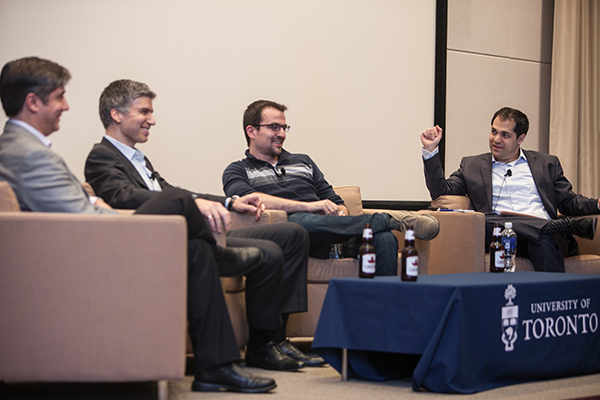February 19, 2014
Cloud computing: breakthrough or buzzword? Alumni gathered on Wednesday, February 12 to hear from three expert panellists on the subject at the latest BizSkule event, hosted at Altera headquarters in San Jose, California.
The panel was moderated by Arshia Tabrizi (CompE 9T5, Law 9T8), a technology lawyer who has been active in the start-up and venture capital industry both in Silicon Valley and Toronto for more than 15 years. The evening’s featured speakers were:
- Alex Grbic (CompE 9T4, MASc 9T6, PhD 0T3) and director of product marketing at Altera.
Alex is responsible for software and IP products at Altera. He has also held management positions in Altera’s software and IP research and development organization, where he headed up external memory interfaces IP development, performance analysis of Altera’s products and work on visualization and debugging tools. Recently, he served as director of applications engineering, where he led escalated customer issue support, initiatives for early adoption of new products and technical collateral.
- Rami Rahim (ElecE 9T4) and executive vice president of the platform systems division at Juniper Networks, Inc. Rami is responsible for driving strategy, development and business growth for Juniper’s routing, switching, branch and wireless LAN products, as well as for the ongoing evolution of its silicon technology and the Junos operating system. He spent the majority of his 16 years at Juniper developing the architecture, design and implementation of Ethernet products and later held several leadership roles in the company’s Edge and Aggregation Business Unit. In addition to his ECE degree, he holds a Master of Science degree in electrical engineering from Stanford University.
- Yuri Sagalov (EngSci 0T8+PEY) and co-founder and CEO of AeroFS.
After completing his U of T Engineering Science degree in computer engineering, in 2010 Yuri took a leave of absence from his Master’s degree studies in distributed systems to co-found AeroFS, an enterprise file syncing and collaboration start-up.
Sagalov provided a concise definition for cloud computing: it allows end-users to employ servers like software, to abstract the complexity of hardware away from their business. “The whole point behind cloud computing is that you shouldn’t have to care,” said Sagalov. “The evolution of the term is ongoing, but the idea is that you can pull up those services like software.”
And as demand for data spikes, reliance on remote datacentres is something more people, and more businesses, will need. “What we’re seeing is an explosion of bandwidth requirements,” said Grbic. “The requirements per service are going from hundreds of megabits per second to terabits per second—we’re seeing an order of magnitude jump.”
“Data by itself in large quantities is of little value,” said Rahim. “There is so much information that is stuck in the network today—information about traffic patterns, information about user behaviour—all of that could be incredibly powerful.” He added, “Networks today are typically one-size-fits-all…but I think the future is going to be much more customizable, and that is the mission we’re on at Jupiter.”
The group closed with a discussion of the greatest challenges facing their businesses, and the panellists agreed finding talent tops the list. “Finding good people is so incredibly difficult,” said Sagalov. “There’s no better time to be a software engineer and an engineer in general.”
“It is clear to see the importance of engineering in offering solutions for the most challenging global problems,” said Professor Cristina Amon, dean of the Faculty of Applied Science & Engineering, in her welcome introduction. “Our alumni are a testament to the remarkable contributions of U of T engineering.”
The next BizSkule event takes place April 30, 2014 in Toronto on the topic of space and aviation.

